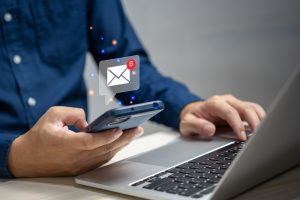Email marketing is a powerful tool, but its efficacy lies in its personalization. By tailoring your emails to the needs and interests of each individual, you can dramatically increase your engagement and conversion rates. In this comprehensive guide, we’ll take a deep dive into email marketing personalization. We’ll examine its importance, unpack different strategies for enhancing personalization, look at successful case studies, design a personalized email marketing plan, and address potential challenges. We’ll also look at the exciting future trends in email marketing personalization. Ready to get started?
Understanding Email Marketing Personalization
Personalization in Email Marketing turns generic communications into relevant messages tailored to each recipient. It’s the fine line separating an engaging email from one that’s instantly forgotten. Each email feels like a one-on-one conversation, including personal touches like names, content relevant to individual interests, or past interactions. This approach increases engagement, loyalty, and, ultimately, conversion rates.
Understanding the mechanics behind personalization is crucial for any effective email marketing strategy. It leverages data insights and technology to deliver messages that resonate personally with each subscriber. Effective personalization goes beyond the basics, offering content that reflects the recipient’s needs, preferences, and behavior.
The Importance of Personalization in Email Marketing
Why does personalization matter? The answer lies in its remarkable impact on customer engagement and sales. Personalized emails boast higher open, click-through, and conversion rates than their generic counterparts. They make recipients feel valued and understood, strengthening the bond between the customer and the brand. According to a study by Experian, personalized emails generate six times higher transaction rates and revenue per email than non-personalized emails.
Personalization is a powerful tool that can significantly enhance the customer experience. When brands deliver tailored content to their subscribers, they provide relevant and useful information that meets their needs. Companies can build trust and foster loyalty by considering the recipients’ preferences and previous interactions with the brand, encouraging repeat business and positive word-of-mouth. This is why personalized marketing has become such an important part of modern-day marketing strategies, as it allows brands to establish deeper connections with their customers and ultimately improve their bottom line.
What is Email Marketing Personalization?
Personalization has been a buzzword in email marketing for a while now, but it’s not just a trend. It’s a proven tactic that can help businesses boost their email marketing campaigns’ performance by increasing their relevance to recipients. However, not all personalization strategies are equal; some may fall short of their intended goal. That’s why it’s crucial to evaluate your current email personalization strategy to see how effective it is and identify areas for improvement.
To start, deeply dive into your email marketing campaigns’ performance data. Look at metrics like open rates, click-through rates, and conversion rates to see how well your campaigns perform. Then, analyze the level of personalization used in past emails – are you going beyond using just the recipient’s name? Consider how well you use available data, such as purchasing history, email engagement, and website behavior. Are you using this data to create personalized content that resonates with your audience? By understanding your email marketing performance and personalization approach, you can identify gaps in your strategy and brainstorm ways to fill them.
The goal is to find opportunities to increase the relevance and efficacy of your personalized email marketing campaigns. For instance, you may realize that you’re not using available data to its full potential or not segmenting your audience effectively. Maybe you’re relying too heavily on first-name personalization and not considering other factors that could make your emails more relevant to your audience. Whatever gaps you identify, address them in your strategy moving forward. By doing so, you’ll be able to create personalized email campaigns that resonate with your audience, drive engagement, and, ultimately, boost your business’s bottom line.
Strategies to Enhance Personalization in Email Marketing
Enhancing personalization in your email marketing efforts requires a blend of creativity, data analysis, and technological tools. It’s about understanding your audience deeper and tailoring your communications to meet their needs. Here, we explore effective strategies for elevating personalization in your email campaigns.
Harnessing the Power of Segmentation
Segmentation divides your email list into smaller, more targeted groups based on specific criteria like demographics, purchase history, or engagement level. This allows for more precise personalization, as you can craft messages that speak directly to the interests and needs of each segment. For instance, send a product recommendation email to a segment that recently viewed those products on your site.
Effective segmentation enhances the relevancy of your messages, improving engagement rates and driving conversions. It’s a foundational step in delivering personalized experiences to your subscribers. Plus, with the help of marketing automation tools, you can easily set up dynamic segments that update in real-time as your subscribers’ behaviors change. This ensures that your messages are always timely and relevant.
Leveraging Dynamic Content
Dynamic content changes based on the recipient’s information, behavior, or preferences. It’s a powerful tool for personalization, as it automatically tailors the content of your emails to match each subscriber’s profile. For example, it includes product recommendations based on a subscriber’s browsing history or past purchases.
Implementing dynamic content in your emails ensures that each recipient receives the most relevant and engaging message possible. It takes personalization to the next level, making each email feel custom-made, and with 77% of consumers more likely to purchase when receiving personalized emails, it’s clear that dynamic content can significantly impact your email marketing success.
But how does dynamic content work? It’s all thanks to data and segmentation. Collecting and analyzing customer data allows you to segment your audience into different groups based on demographics, interests, behavior, or other relevant factors. You can then use this information to create specific versions of your emails that will be sent to each group.
Utilizing Behavioral Triggers and Automation
Behavioral triggers and marketing automation allow you to send timely, relevant emails based on your subscribers’ specific actions. Whether it’s an order confirmation email after a purchase, a reminder for an abandoned cart, or a special offer on a subscriber’s anniversary, these personalized messages ensure that you communicate the right message at the right time.
Automations streamline sending personalized emails, making it easier and more efficient to maintain ongoing engagement with your subscribers. They’re essential for scaling personalization in your email marketing strategy. By setting up automated emails triggered by specific actions, you can continue to provide relevant content and offers without having to send each one manually.
Furthermore, behavioral triggers allow you to segment your email list based on subscriber behavior. This means you can create targeted campaigns for subscribers interested in a particular product or service, increasing the likelihood of conversions. For example, if a subscriber clicks on a link for a specific product in your email, you can automatically include them in an email series with more information and promotions about that product.
Building a Personalized Email Marketing Plan
Armed with insights from successful case studies, it’s time to construct a robust personalized email marketing plan for your brand. This involves strategic planning, tool selection, and continuous optimization to ensure your personalized messages resonate with your audience.
Steps to Create a Personalized Email Marketing Strategy
The first step in creating a personalized email marketing strategy is to define your objectives and understand your audience deeply. Gather and analyze data about your subscribers to uncover their preferences, behaviors, and needs. Next, segment your email list accordingly and decide on the types of personalized content you’ll offer.
Establishing a clear strategy establishes a solid foundation for effective personalization that engages and converts. This includes determining the frequency of your emails, setting clear goals for each email campaign, and crafting a consistent brand message.
Selecting the Right Email Personalization Tools
Choosing the right email marketing tool is crucial for effectively implementing personalization. Look for tools that offer advanced features like segmentation, dynamic content, and marketing automation. These features enable you to deliver personalized email experiences at scale.
Additionally, consider tools that integrate easily with your CRM or other third-party apps to leverage the data you already have. This integration enhances your ability to send highly personalized and relevant messages to your audience. Some popular email personalization tools include Mailchimp, Constant Contact, Zapier, Zendesk Sell, and HubSpot. Each of these offers a variety of features and pricing options to fit your specific needs.
Monitoring, Adjusting, and Optimizing Your Personalized Email Campaigns
To improve your email marketing, it is important to personalize your campaigns and continually monitor their effectiveness. Analyzing the results of your campaigns will help you make data-driven adjustments and refine your strategy over time.
Remember, personalization is a continual process that requires ongoing attention and effort. Testing different aspects of your emails, from subject lines to personalization tactics, helps you identify the most effective approaches. This iterative process ensures that your personalized email marketing strategy remains effective and engaging.
Overcoming Challenges in Email Marketing Personalization
Tackling Data Privacy Concerns
In personalized email marketing, respecting user data and privacy laws are paramount. Marketers must navigate the fine line between personalization and privacy invasion. This includes obtaining explicit consent through subscription forms, being transparent about data usage, and providing easy opt-out options. Compliance with regulations, such as GDPR and CCPA, ensures trust and maintains the integrity of your email campaigns.
One practical approach is using email marketing tools that prioritize data security. These tools should offer features that help manage and safeguard subscriber information, such as secure storage of personal details and encryption of sensitive data. Remember, a campaign monitor customer who feels their data is secure is more likely to engage with your personalized messages.
Managing Technical and Resource Limitations
Small teams or businesses often face technical and resource constraints. This can make sophisticated personalization tactics seem out of reach. Yet, even small teams can create highly personalized campaigns by leveraging automation and integrating with third-party apps. Email marketing software often has built-in features like dynamic content, marketing automation, and segmenting tools that reduce manual efforts.
Another strategy is to build your personalization capabilities progressively. Start with basic personalization, such as using a customer’s name in the subject line or sending birthday emails. Gradually, as you become more comfortable with the tools and collect more data, implement advanced tactics like product recommendations based on browsing history.
Purchase Abandonment & Recommendations
Purchase abandonment emails and tailored recommendations are powerful email personalization strategies. They leverage behavioral triggers and automation to send relevant messages quickly. For instance, using a customer’s browsing history or past purchases to send personalized product recommendations automatically can significantly increase conversion rates.
This strategy requires sophisticated email marketing, like HubSpot Marketing and MailChimp, capable of tracking website behavior and automation that triggers personalized emails based on specific actions. Tools that integrate with your website and shopping cart can help identify when a potential purchase is abandoned and send a timely personalized email to encourage completion of the potential purchase.
Continuously Keeping Personalization Relevant and Engaging
Maintaining personalized content’s relevance and engagement level is a constant challenge marketers face in today’s e-commerce. Customers’ preferences and behaviors change over time, requiring marketers to update their personalization strategies regularly. Use analytics tools to track the performance of personalized emails and be ready to adjust strategies based on customer feedback and engagement metrics.
Consistently testing different personalization elements, from subject lines to dynamic content, helps understand what resonates with your audience. It’s important to keep the content fresh and relevant, adjusting personalization tactics based on customer journey stages, recent interactions, and evolving interests.
Future Trends in Email Marketing Personalization
Prediction of the Evolution of Personalization in Email Marketing
The future of email marketing personalization lies in the increasingly sophisticated data usage to offer unprecedented customization. Predictive analytics, AI, and real-time data will drive highly individualized content. Marketers will move beyond basic personalization tactics to create unique customer experiences based on a deep understanding of individual preferences and behaviors.
Email campaigns will become more interactive, with emails as a microsite offering a personalized shopping experience. Advances in technology will allow for the seamless integration of personalized content directly within the email, reducing the need for multiple clicks and leading to higher engagement rates.
How AI and Machine Learning Can Enhance Personalization
AI and machine learning are set to revolutionize email personalization by automating data analysis and decision-making processes. Platforms such as Emarsys and Unspam.email can identify patterns in customer data, predict future behaviors, and automatically tailor emails to individuals at scale. For example, AI can optimize send times, personalize email content in real time, and select subject lines likely to result in higher open rates.
Machine learning algorithms improve over time, constantly refining the personalization of emails based on interactions and feedback. This leads to more relevant messages, higher engagement, and improved email campaign performance.
The Role of Personalization in Mobile Email Marketing
With most emails being opened on mobile devices, marketing personalization is paramount. This includes designing mobile-friendly emails and effectively using shorter subject lines and pre-header text. Personalization for mobile also means considering the context in which emails are read, such as time of day, location, and device type, to tailor the content accordingly.
Geolocation technology, for instance, can personalize offers based on a customer’s real-time location, delivering highly relevant and timely messages. The future will see an increase in mobile-specific personalization strategies, further enhancing the effectiveness of email marketing campaigns.
Wrapping up – Your Checklist for Personalizing Email
Your Next Steps to Advanced Personalized Email Marketing
As you’ve probably figured out by now, personalization is key if you want to make sure that your email marketing campaigns stand out from the crowd. To take personalization to the next level, there are some steps that you should consider:
- Ensure compliance with data privacy laws and prioritize subscriber data security.
- Utilize marketing automation and third-party integrations to enhance personalization capabilities.
- Implement behavioral triggers and dynamic content to send personalized messages based on real-time data.
- Regularly review and adjust your personalization strategy based on customer feedback and analytics.
- Stay informed on the latest technologies and trends in email marketing to refine your approach continuously.
Conclusion: Key Takeaways for Successful Email Marketing Personalization
Email marketing personalization is a powerful tool for reaching customers meaningfully. Overcoming challenges such as data privacy concerns, technical limitations, and maintaining relevancy requires strategic planning, the right technology, and a commitment to continuous improvement. As technology evolves, so will the sophistication of personalized marketing campaigns, offering exciting opportunities to connect with customers on a deeper level. Businesses can create meaningful and impactful email marketing campaigns that drive engagement and conversions by leveraging data, segmenting audiences, and crafting personalized messages. So don’t wait any longer – start incorporating personalization into your email marketing strategy today!




